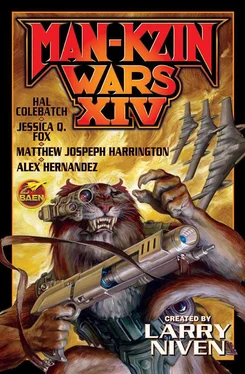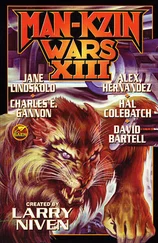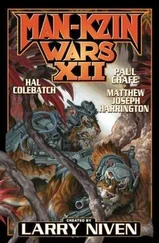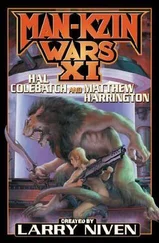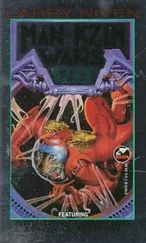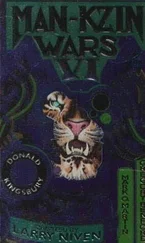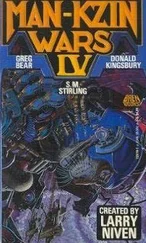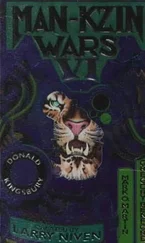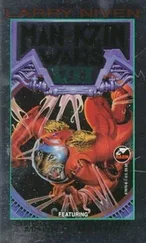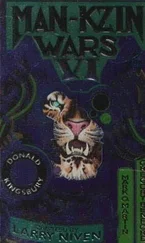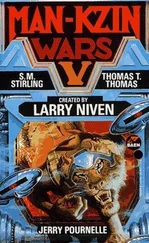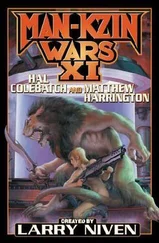Hal Colebatch - Man-Kzin Wars – XIV
Здесь есть возможность читать онлайн «Hal Colebatch - Man-Kzin Wars – XIV» весь текст электронной книги совершенно бесплатно (целиком полную версию без сокращений). В некоторых случаях можно слушать аудио, скачать через торрент в формате fb2 и присутствует краткое содержание. Год выпуска: 2015, Жанр: Фантастика и фэнтези, на английском языке. Описание произведения, (предисловие) а так же отзывы посетителей доступны на портале библиотеки ЛибКат.
- Название:Man-Kzin Wars – XIV
- Автор:
- Жанр:
- Год:2015
- ISBN:нет данных
- Рейтинг книги:3 / 5. Голосов: 1
-
Избранное:Добавить в избранное
- Отзывы:
-
Ваша оценка:
- 60
- 1
- 2
- 3
- 4
- 5
Man-Kzin Wars – XIV: краткое содержание, описание и аннотация
Предлагаем к чтению аннотацию, описание, краткое содержание или предисловие (зависит от того, что написал сам автор книги «Man-Kzin Wars – XIV»). Если вы не нашли необходимую информацию о книге — напишите в комментариях, мы постараемся отыскать её.
Man-Kzin Wars – XIV — читать онлайн бесплатно полную книгу (весь текст) целиком
Ниже представлен текст книги, разбитый по страницам. Система сохранения места последней прочитанной страницы, позволяет с удобством читать онлайн бесплатно книгу «Man-Kzin Wars – XIV», без необходимости каждый раз заново искать на чём Вы остановились. Поставьте закладку, и сможете в любой момент перейти на страницу, на которой закончили чтение.
Интервал:
Закладка:
We were taken to one of the empty buildings and told to wait. The waiting was not pleasant. There was no point in running or speculating on the future. Finally a collabo security guard returned, accompanied by a kzin whose title, we were told, was Slave Supervisor, prefixed by some distinguishing number, and a telepath. The telepath ran over our minds quickly, not very thoroughly, as far as I could tell, merely establishing that there were no feral monkeys among us. Then we were taken into another room. There were a couple of dozen kzin reclining on footches . By this time I was on the verge of fouling myself with terror, and nearly fainted, but it passed, and I began to notice things.
A large number of these kzin looked like cripples, with missing limbs or eyes. Also, to judge from the white fur, a number were old. A couple were overweight, and some were small and scrawny. Three were completely black-furred, the color of their priesthood. Not many, apart from a few who were clearly disabled veterans, had impressive collections of ears on their ear-rings. Most of them, in short, did not look like fighting kzin. Also most of them, as far as I could tell, had a sour look, although that was difficult to tell. And they were carrying, incongruously, what I realized were electronic notebooks. The telepath joined us. Even for a telepath, he looked in bad shape, violet-eyed, hunched and bent, and generally very near the end of the road.
Then the collabo security man explained.
Chuut-Riit, he said, had ordered the study of humans. Some humans had been turned over to a specially designated kzin unit for medical experiments. However, we were more fortunate. Our job would be to teach these kzin about human society. Von Kleist would teach literature, Thompson would teach history, and I would teach politics. That explained the curious composition of this group. They were the kzin equivalent of academics or intellectuals, or poor fighters, and, apart from the priests, whose position was anomalous, and the honorably crippled, lowly and despised in their own society. Even so, to us they were threatening enough. Still, the class was orderly. Kzin were bad administrators. But they enforced their orders with ruthless discipline.
Von Kleist was a haughty aristocrat, with the asymmetrical beard and mobile ears of a true Herrenmann . He left no one in any doubt that he considered himself several cuts above other members of the faculty and considered teaching at a university to be beneath him. Thompson was a little cock-sparrow of a man, also with a gift for rubbing people up the wrong way. I wondered how long their very limited diplomatic skills would keep them alive among the kzin. Both of them, I felt, regarded the war as vulgar, and human patriotism as the greatest vulgarity of all. Well, their meals were still being delivered three times a day, and they had not become meals yet.
The teaching, conducted in the slaves’ patois, was not terribly difficult, but hideously stressful. The kzinti had been ordered to learn, and they learned. After a few days, when my terror had subsided somewhat, I even found it interesting to explain voting and parties and majorities. Inevitably, our teaching overlapped somewhat (another possible pitfall-don’t bore them!). Otherwise, I knew I was fairly safe, so long as I did not insult them, and there was no call to do that. The main thing was not to imply that monkey social organization was in any way superior to that of the Heroes. A major difficulty was that I dared not give them tests, which they might possibly fail. I became adept, I think, at the use of various psychological tricks for having the cleverer ones discipline the stupid and lazy. If I dared not sneer at their work, another kzin might, and the resultant death-duel did not displease me. I could not be blamed for it.
I kept in mind H. G. Wells’s ancient story The First Men on the Moon , in which the foolish scientist, Cavor, marooned on Earth’s Moon, was killed by the inhabitants after telling them too much about human society. We got some help: Morris, a shy little man, was drafted to assist us. He had had some family on Wunderl-on Ka’ashi -but had none now, and the experience had broken his spirit. Someone told me he had suffered from hysterical blindness for many months afterwards. Anyway, he fetched and carried for us, did our research, cowered at the sight of even an old or crippled kzin, and generally made no trouble.
I found a digest of Nietzsche’s aphorisms, presumably brought from Earth by one of the nineteen Herrenmanner families, and destroyed it. “The weak and the botched must perish…I tell you that a good war hallows every cause.” I thought they had rather too much of that doctrine already. Markham, the guerrilla leader was, I knew, devoted to Nietzsche.
At least my conscience was clear. I could not see how teaching them the basics of human civics could harm the human war effort. As time went on, the idea even came to me that I might be importing some civilized values into their minds-but perhaps that was self-deception.
I taught them the theories of Adam Smith, and, straying out of my area somewhat dangerously, of James Watt and the generations-long endeavors which had led to the harnessing of steam, and then of electricity. I found that some of them, including the telepath, had a surprising interest in religion and its role in the history of science. I quoted to them an epigram I remembered from Einstein: “Science without religion is lame, religion without science is blind.” I told them of the troubles Columbus had had in gaining finance for his voyages, and the parallel troubles that had nearly destroyed the early American space program. Some of my students, it seemed to me, were coming to comment upon human institutions with less that total disgust. This, I thought, was not uncommon among certain people who studied any subject. Students of some of the vilest societies on Earth, assigned to study them only for the purpose of defeating them, had come to admire them. This also made me feel better about what I was doing. Further, I was learning about them. There was little they bothered to hide from a monkey.
Although literature was not my subject, I learned a little about their own. They had some works I would call “thrillers,” but reading or viewing them was considered somewhat shameful, like watching pornography. Their respectable literature dealt with Lord Chmeee and other ancient Heroes, and was embellished with as many stylistic conventions as a Japanese Noh drama or an American Western. When the conventions were not observed, they often had difficulty in telling fact from fiction (I had to be very careful not to humiliate them here). I did not envy my colleagues, scrabbling in their little free time in the archives of the University for books and fragments which had been brought from Earth and forgotten in the excitement of settling a new planet in order to put inoffensive courses together.
I did not see as much of the other three humans as you might expect. By the end of the day we were all too mentally exhausted to socialize. Two or three of my kzin students, mainly the telepath, who, I gathered, was regarded as having become almost useless for real work (which was reassuring) took to seeking me out after hours with questions. Though my free time was limited and precious, I came to find this flattering. I talked some geriatric treatments out of the collabo Government, not exactly telling them, or myself, that I was civilizing the kzin (those telepath sweeps! Always a haunting dread!), but allowing them to draw that conclusion for themselves. The ubiquitous threat of telepaths was subtly changing the ways all humans thought and communicated. Fortunately for us, telepaths were rare, and were assigned to military duties nearly all the time. Even luckier, our telepath, who, I guessed, was assigned to the class to keep a more-or-less watching brief over us all, human and kzin, was of relatively mild nature. When I saw him he did not inject himself with the sthondat -lymph drug which heightened his powers, and I did not feel the headache which would have indicated that he was reading my mind. The telepath and I played chess occasionally. Most kzin adore chess, regarding it along with blow-dryers, talcum powder and toilet paper as the finest fruit of human civilization. I had an ulterior motive in this: there was no point in the telepath playing chess if he read my mind: that would have made it no game. So I was, I felt, subtly conditioning him to interact with me but to leave my mind alone. Even so, I dared not insult him by letting him win. He played like a typical kzin-fast and aggressive. He generally lost the first few games in short order, coming dangerously close to losing his temper-he could crush a solid metal chessman in his claws in a rage-but would then improve. I caught no trace of him probing my mind; it was just the way he worked. Of course, no other kzin would play with him. It was also a chance to pick up scraps of gossip from him-the kzin, or Telepath at least, cared little about military security. I gathered some details of the humans who were still fighting in the great caves, in Grossgeister Swamp, in the eastern hills and on the other, sparsely settled land masses. Battles were going on in space, and Sol System was still putting up fleets.
Читать дальшеИнтервал:
Закладка:
Похожие книги на «Man-Kzin Wars – XIV»
Представляем Вашему вниманию похожие книги на «Man-Kzin Wars – XIV» списком для выбора. Мы отобрали схожую по названию и смыслу литературу в надежде предоставить читателям больше вариантов отыскать новые, интересные, ещё непрочитанные произведения.
Обсуждение, отзывы о книге «Man-Kzin Wars – XIV» и просто собственные мнения читателей. Оставьте ваши комментарии, напишите, что Вы думаете о произведении, его смысле или главных героях. Укажите что конкретно понравилось, а что нет, и почему Вы так считаете.
